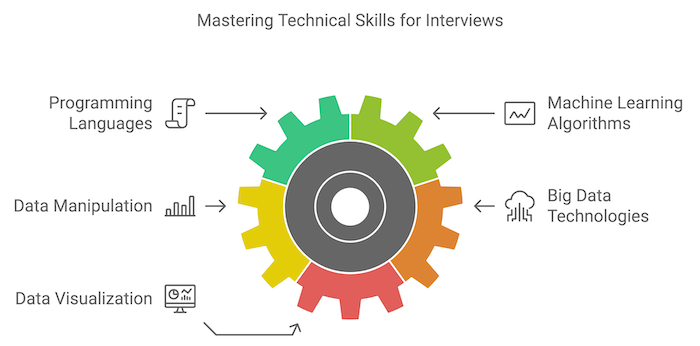Are you gearing up for a data scientist interview? You’re in the right place! This comprehensive guide will walk you through every aspect of the data scientist interview process, from technical skills to behavioral questions and business acumen. Whether you’re a seasoned professional or just starting your data science journey, this article will help you put your best foot forward and land your dream job.

Understanding the Data Scientist Interview Process
Before diving into specific preparation strategies, it’s crucial to understand what you’re up against. The data scientist interview process typically involves several stages:
- Phone Screening: An initial conversation to assess your background and interest in the role.
- Technical Interview: In-depth questions about your programming skills, statistical knowledge, and problem-solving abilities.
- Behavioral Interview: Questions about your past experiences, teamwork, and communication skills.
- Case Study or Take-Home Assignment: A practical test of your data analysis and presentation skills.
- On-Site Interview: A series of face-to-face interviews with team members and leaders.
According to a recent survey, data scientists go through an average of 3-5 interview rounds before receiving an offer. Each company may have its unique approach, so it’s essential to ask your recruiter about the specific process for the role you’re pursuing.
Essential Technical Skills to Master
To ace the technical portion of your data scientist interview, you’ll need to brush up on a variety of skills. Here are the key areas to focus on:
1. Programming Languages
- Python: The most popular language for data science. Be prepared to write clean, efficient code.
- R: Still widely used, especially in academic and research settings.
- SQL: Essential for data manipulation and querying databases.
2. Machine Learning Algorithms and Concepts
- Supervised vs. Unsupervised Learning
- Classification, Regression, and Clustering techniques
- Model evaluation and validation methods
3. Data Manipulation and Analysis
- Pandas for data manipulation in Python
- Data cleaning and preprocessing techniques
- Feature engineering and selection
4. Big Data Technologies
- Familiarity with Hadoop, Spark, or other big data frameworks
- Understanding of distributed computing concepts
5. Data Visualization Techniques
- Creating clear, insightful visualizations using libraries like Matplotlib, Seaborn, or ggplot2
- Communicating complex findings through visual storytelling

Pro Tip: Practice implementing these skills through personal projects or on platforms like Kaggle. This hands-on experience will boost your confidence and provide real-world examples to discuss in your data scientist interview.
Acing Behavioral Interview Questions
While technical skills are crucial, don’t underestimate the importance of soft skills. Many companies use behavioral interviews to assess how you’ll fit into their team and culture. Here are some common questions you might encounter:
- Describe a challenging data science project you’ve worked on. How did you approach it?
- Tell me about a time when you had to explain complex technical concepts to non-technical stakeholders.
- How do you handle disagreements with team members about methodologies or approaches?
- Can you share an example of how you’ve used data to drive business decisions?
To answer these questions effectively, use the STAR method:
- Situation: Set the context for your story.
- Task: Explain your responsibility in that situation.
- Action: Describe the steps you took to address the challenge.
- Result: Share the outcomes of your actions.
Remember, interviewers are looking for evidence of your problem-solving skills, teamwork, communication abilities, and adaptability. Prepare specific examples that showcase these qualities.
Demonstrating Business Acumen
A standout data scientist doesn’t just crunch numbers—they understand how their work impacts the business. Here’s how to show your business savvy:
- Understand Key Business Metrics: Familiarize yourself with common KPIs in your industry. For example, in e-commerce, you might discuss metrics like Customer Lifetime Value (CLV) or Churn Rate.
- Connect Data to Business Outcomes: Be prepared to explain how your data analysis can lead to actionable insights. For instance, how predictive modeling could optimize marketing spend or improve customer retention.
- Case Study Approach: Many interviews include a business case study. Practice analyzing business scenarios, identifying key issues, and proposing data-driven solutions.
- Industry Knowledge: Stay up-to-date with trends and challenges in the industry you’re interviewing for. This shows initiative and helps you contextualize your skills.
By demonstrating your ability to bridge the gap between data analysis and business strategy, you’ll set yourself apart from candidates who focus solely on technical skills.
Practice Resources and Mock Interview Tips
Preparation is key to interview success. Here are some resources and strategies to help you practice:
- Online Platforms for Technical Practice:
- LeetCode: Great for coding challenges and algorithm practice.
- HackerRank: Offers a wide range of data science and coding problems.
- DataCamp: Provides interactive courses and projects in data science.
- Conducting Effective Mock Interviews:
- Partner with a friend or colleague in the field for realistic practice.
- Record yourself answering questions to improve your delivery.
- Use platforms like Pramp for peer-to-peer mock technical interviews.
- Managing Interview Anxiety:
- Practice deep breathing exercises to stay calm.
- Visualize success in the days leading up to your interview.
- Remember that interviews are a two-way street—you’re also evaluating if the company is a good fit for you.
Pro Tip: After each mock interview or practice session, reflect on your performance. Identify areas for improvement and adjust your preparation accordingly.
Putting It All Together: Your Data Scientist Interview Success Plan
As you embark on your interview preparation journey, remember that success comes from a balanced approach. Here’s a quick checklist to ensure you’re covering all bases:
- Review and practice essential technical skills
- Prepare stories for behavioral questions using the STAR method
- Brush up on industry trends and company-specific information
- Practice explaining complex concepts in simple terms
- Conduct mock interviews and solicit feedback
- Prepare thoughtful questions to ask your interviewers
Remember, continuous learning is crucial in the ever-evolving field of data science. Stay curious, keep practicing, and approach each interview as an opportunity to learn and grow.
Are you ready to take the next step in your data science career? For professional help in crafting an impressive data scientist resume, explore our IT resume writing service.
We’d love to hear about your data scientist interview experiences or any additional tips you might have. Share your thoughts in the comments below, and let’s help each other succeed in this exciting field!




